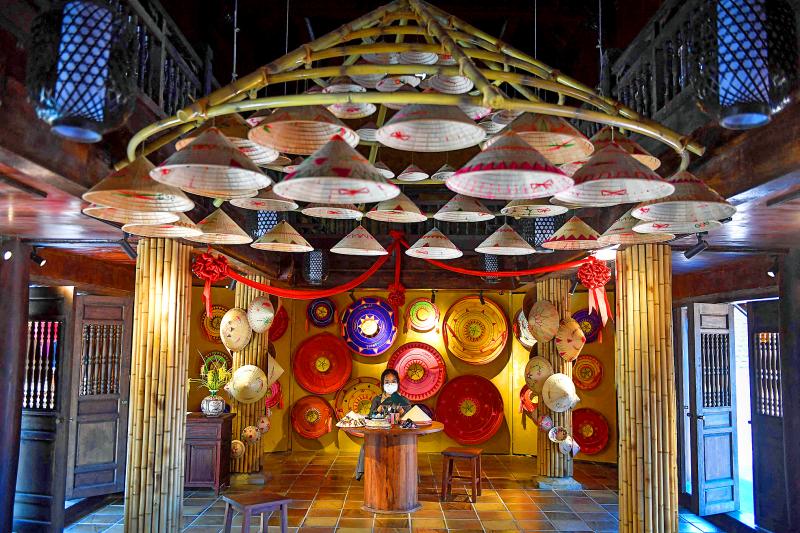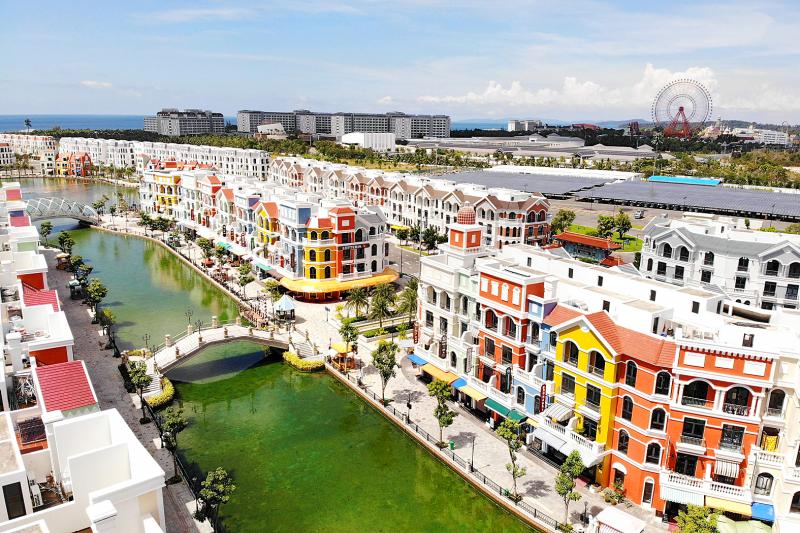Tour guide Lai Chi Phuc has been counting down the days until travelers return to the white-sand beaches and thick tropical jungle of Vietnam’s Phu Quoc, a once-poor fishing island pushing to be Asia’s next holiday hot spot as COVID-19 pandemic restrictions ease.
Yesterday, about 200 South Koreans were to arrive on the island, which lies a few kilometers off Cambodia in the azure waters of the Gulf of Thailand, after a vaccine passport scheme started this month in Vietnam.
Far from a lazy beach break, their stay promises to be a whirlwind of action and entertainment as they shuffle between a 12,000-room hotel complex, an amusement park, 18-hole golf course, casino, safari park and miniature Venice.

Photo: AFP
The US$2.8 billion leisure resort, part of the “sleepless city” model, opened six months ago as COVID-19 ravaged tourism around the world — and as other Asian countries reliant on the industry, like Thailand, were rethinking their mass tourism frameworks.
For 33-year-old Phuc, who remembers a poverty-stricken childhood when “everyone wanted to escape Phu Quoc,” the island’s growing popularity gave him a way to return home after years of scratching out a living as a salesman in the nearby cities of the Mekong Delta.
“But it’s a pity also,” he said, lamenting the loss of the island’s palm-fringed beaches to resorts.

Photo: AFP
Ahead of the reopening, staff at Vinpearl resort — where yesterday’s arrivals were to stay — swept beaches, arranged cutlery on tables and laid out sunbeds. Others busied themselves painting delicate flowers on conical hats.
“When we heard visitors were coming back, I was just so excited,” duty manager Ngo Thi Bich Thuong said.
Before the pandemic in 2019, about 5 million people, including 500,000 foreigners — mostly from China, South Korea, Japan and Russia — vacationed on Phu Quoc.
Vingroup — the enormously powerful conglomerate behind the new complex — is pushing to make the island “a new international destination on the world tourist map.”
To cater for the tourist boom, 40,000 hotel rooms have been built, planned or are under construction, vice chairman of the Vietnam Tourism Advisory Board Ken Atkinson said — “that’s more hotel keys than they have in Sydney, Australia.”
Globally popular vacation spots such as Thailand’s Phuket have given Vietnam something to aim for.
Atkinson took a group of senior Vietnamese government officials there in 2005 — but while Phuket’s vibrant international tourist scene took years to build up, “Vietnam has a tendency of wanting to do everything all at once,” he said.
“Unfortunately I don’t think there was enough attention given to what would be in the long-term benefit of the island,” he added.
Phu Quoc is a UNESCO biosphere reserve — surrounding waters are stuffed with coral reefs and its beaches were once nesting spots for Hawksbill and Green turtles.
No nesting has taken place in the past few years, the UN body said in their last assessment in 2018.
The World Wide Fund for Nature has warned of “an almost unimaginable flood of plastic” that chokes rivers, canals and sealife.
About 160 tonnes of trash — almost enough to fill 16 trucks — is generated daily, according to the fund, which says the island’s waste management is not fit to cope with the tourism explosion.
“More and more tourists are very conscious of the environment. They don’t want to be going to places where beaches are littered or where effluent is going into the sea,” Atkinson said.
Alongside the trash, and the garish headline attractions — including the world’s longest nonstop three-rope cable car and Vietnam’s first teddy bear museum — there are still pockets of paradise.
Chu Dinh Duc, 26, from mainland Vietnam, first saw Phu Quoc from the back of a motorbike in 2017.
Speeding through dense forests and winding his way to the few remaining sleepy villages where fishermen cast their nets into the ocean as the sun came up, he fell in love.
Two years later, he opened a simple homestay business catering to foreigners.
“My goal here is not to take a lot of their money,” he said. “But I want as many as possible to come.”
“If Phu Quoc remained undeveloped, it would just be a pearl undiscovered,” he added.

‘THEY KILLED HOPE’: Four presidential candidates were killed in the 1980s and 1990s, and Miguel Uribe’s mother died during a police raid to free her from Pablo Escobar Colombian presidential candidate Miguel Uribe has died two months after being shot at a campaign rally, his family said on Monday, as the attack rekindled fears of a return to the nation’s violent past. The 39-year-old conservative senator, a grandson of former Colombian president Julio Cesar Turbay (1978-1982), was shot in the head and leg on June 7 at a rally in the capital, Bogota, by a suspected 15-year-old hitman. Despite signs of progress in the past few weeks, his doctors on Saturday announced he had a new brain hemorrhage. “To break up a family is the most horrific act of violence that

HISTORIC: After the arrest of Kim Keon-hee on financial and political funding charges, the country has for the first time a former president and former first lady behind bars South Korean prosecutors yesterday raided the headquarters of the former party of jailed former South Korean president Yoon Suk-yeol to gather evidence in an election meddling case against his wife, a day after she was arrested on corruption and other charges. Former first lady Kim Keon-hee was arrested late on Tuesday on a range of charges including stock manipulation and corruption, prosecutors said. Her arrest came hours after the Seoul Central District Court reviewed prosecutors’ request for an arrest warrant against the 52-year-old. The court granted the warrant, citing the risk of tampering with evidence, after prosecutors submitted an 848-page opinion laying out

STAGNATION: Once a bastion of leftist politics, the Aymara stronghold of El Alto is showing signs of shifting right ahead of the presidential election A giant cruise ship dominates the skyline in the city of El Alto in landlocked Bolivia, a symbol of the transformation of an indigenous bastion keenly fought over in tomorrow’s presidential election. The “Titanic,” as the tallest building in the city is known, serves as the latest in a collection of uber-flamboyant neo-Andean “cholets” — a mix of chalet and “chola” or Indigenous woman — built by Bolivia’s Aymara bourgeoisie over the past two decades. Victor Choque Flores, a self-made 46-year-old businessman, forked out millions of US dollars for his “ship in a sea of bricks,” as he calls his futuristic 12-story

FORUM: The Solomon Islands’ move to bar Taiwan, the US and others from the Pacific Islands Forum has sparked criticism that Beijing’s influence was behind the decision Tuvaluan Prime Minister Feletei Teo said his country might pull out of the region’s top political meeting next month, after host nation Solomon Islands moved to block all external partners — including China, the US and Taiwan — from attending. The Pacific Islands Forum (PIF) leaders’ meeting is to be held in Honiara in September. On Thursday last week, Solomon Islands Prime Minister Jeremiah Manele told parliament that no dialogue partners would be invited to the annual gathering. Countries outside the Pacific, known as “dialogue partners,” have attended the forum since 1989, to work with Pacific leaders and contribute to discussions around